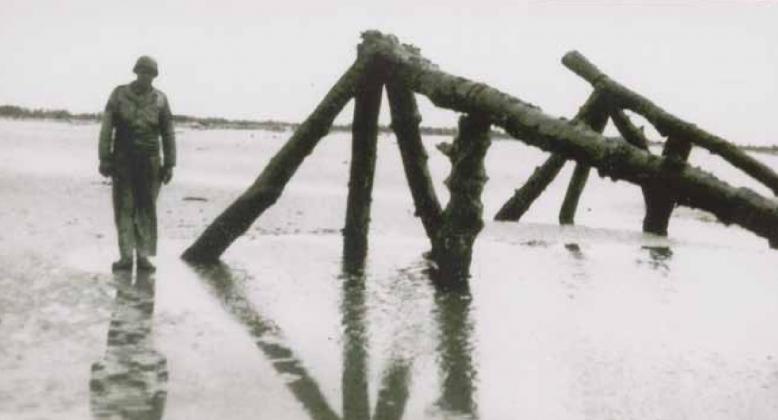D-Day still touches a cord with many Americans
Sitting in the choppy waters of the English Channel the day before D-Day, 20-year-old Private James R. Lambeth wondered what would happen on the beaches of Normandy.
“We had no idea what we were getting into,” recalled Lambeth, a retired Illinois farmer. “I’d never seen combat before, and had no idea what it would be like.”
June 6 marks the anniversary of the massive D-Day invasion and Lambeth, a member of the 37th Amphibious Combat Engineers, was one of 156,000 men on Omaha Beach at Normandy on that day in 1944. Over 70 years later, the action still touches a nerve with many Americans.
Lambeth, 96, now has vivid memories of those fateful hours.
“I don’t know how to explain it, but we really didn’t have time to get scared,” he remarked. “When the guns opened on us, we just had to find cover somewhere. When you saw your buddies start dropping all around you, you knew you’d better do something to make it through.”
The invasion was part of Operation Overlord, a massive offensive spearheaded by Gen. Dwight D. Eisenhower to land enormous Allied forces in western Europe. An estimated 50,000 vehicles, 13,000 planes, and 5,000 ships and landing craft were involved.
One of five beaches along Normandy that saw action, Omaha, was the deadliest on D-Day, mainly because of the imposing German defense. Some 3,000 barricades were placed along the beach, while mines and mortars presented other hazards. Well positioned machine gun nests instantly opened fire as the Allies stepped off their Higgins boats and other transports.
By nightfall, some 100,000 troops had made it ashore. Within five days, over 326,000 soldiers and 100,000 tons of equipment had landed as the beachhead became a key drop-off point for Allied supplies. The offensive ultimately proved successful, and 11 months later, the war in the European theater was over.
Bill Thien, a past national commander-in-chief of the Veterans of Foreign Wars, credits veterans of World War II, including those at Normandy, with changing the world.
“Certainly, they influenced the Thien. “It all would have came out much differently if it wasn’t for what they did.” The term D-Day had practical
The term D-Day had practical meaning. The “D” stands for day, as the planned invasion date was unknown, and dependent on the weather. It was originally thought the landing would take place on June 5, but a storm stranded the troops in the turbulent waters of the English Channel, leaving them soaked and seasick.
Lambeth suffered five severe shrapnel wounds at Omaha Beach, leading to a three-month stay in a military hospital in England. One injury caused nerve damage in his right arm, affecting his ability to farm his land after the war.
“A lot of us wouldn’t talk about Omaha, or the war on the whole, for years afterward,” commented Lambeth. “It was a memory that wasn’t too pleasant, and we didn’t want to think about it.”
The number of surviving veterans of D-Day is dwindling rapidly, as are numbers of World War II participants on the whole. According to the National World War II Museum, an average of 348 World War II veterans die each day in the United States.
“Calling them the “greatest generation” is something that holds up well,” said Thien, who had several relatives who fought and died in World War II. “They went from the Depression to World War II, then they came home, went to work, and raised their families. Very few of them ever complained. It’s just a different group, one that is really special.”
Three-quarters of a century later, Lambeth reflects on his experience on D-Day with great pride.
“It means a lot to me,” he said. “I did the best that I could do, and I feel I did my share to preserve the life and freedoms we have today in this country.”
Tom Emery is a freelance writer and researcher from Carlinville, Ill. He may be reached at (217) 710-8392 or ilcivilwar@yahoo.com.

